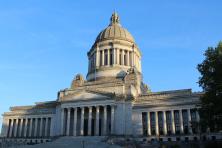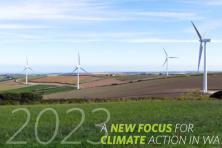There’s just one month left of Washington’s legislative session and EXCITING things are happening! Wednesday marked another key deadline—opposite chamber policy committee cutoff—bills that have made it out of the House and Senate must be passed out of their respective opposite house policy committees in order to continue towards the finish line.
So what’s still in play? Below is a brief update, including new programs funded by the Climate Commitment Act. As always, if you have any questions about any of our policy work, you can respond directly to this email.
Home run for the House budgets!
Budget season is here and all of the House and Senate proposed budgets have now been released. Our team has spent the last week going through the budgets line-by-line to break down how Climate Commitment Act revenue from polluters go towards programs that make clean energy more accessible, address environmental justice, and create tangible benefits in communities all across Washington.
The House budget hit a home run (woohoo!) on two key priorities: electrification incentives for our homes and buildings and cutting pollution from medium- and heavy-duty vehicles:
$115 million to electrify our homes and buildings
The House’s proposed High Efficiency Heating and Cooling program would help fund the electrification of thousands of homes. The federal Inflation Reduction Act provides some electrification funding, but it is insufficient, and the House program will bridge that gap and ensure all households can afford the entire cost of a heat pump and other electric appliances in Washington. The Senate budget falls short, providing only $75 million for energy assessments and potential upgrades, which is less funding than needed to achieve our climate pollution reduction goals.
Over $250 million for clean medium- and heavy-duty vehicles
The House also nailed the transportation budget, investing an unprecedented amount to address climate pollution from medium- and heavy-duty vehicles, like trucks and buses and delivery vans. This meets a critical need to not only reduce climate pollution, but significantly clean up our air as well. Although zero-emission MHD vehicles will offer major fuel savings and lower maintenance costs over time, their upfront cost is currently prohibitive for many, particularly for independent drivers. The Senate fell short here, funding only $56.3 million in incentives and associated infrastructure for these vehicles.
Bills still progressing towards the finish line:
Clean Energy Siting (HB 1216)
The transition to 100% clean electricity, transportation, and buildings will take significant investments in new clean energy. HB 1216 helps facilitate the development of clean energy through upfront planning and broad engagement while increasing the state’s capacity to examine a growing number of project proposals. We strongly support this bill and have worked with other environmental partners, labor organizations, utilities, the business community, and others to come to agreement on the bill. HB 1216 moved through the House and has a public hearing in Senate Ways & Means today (March 31st); we expect it to move out of Ways & Means before fiscal cutoff April 4th.
Large Gas Utility Decarbonization (HB 1589)
Washington gas utilities must begin planning now to achieve the State’s required climate pollution requirements. HB 1589 requires Puget Sound Energy—Washington’s largest gas and electric utility—to file a gas decarbonization plan, ensure no new residential and commercial customers connect to the gas system, and create comprehensive programs to transition customers off of fossil fuels. This bill has seen significant changes since its introduction, and charts a strong pathway for Puget Sound Energy to decarbonize while protecting low-income customers in the process. HB 1589 moved through the House and Senate Committees and its next step will be the Senate floor.
Utility shut-offs (HB 1329)
With increasing summer temperatures and impacts from heat, it is critical for people’s health and safety that utility services are not disconnected during heat waves. HB 1329 will prevent electric and water utilities from terminating service to residential customers on days for which the National Weather Service has issued certain heat-related alerts. Washington currently has a winter moratorium on utility shut-offs for low-income customers only, and this would provide some protections in the summer, too. HB 1329 passed through the House process, moved through Senate Committees, and is awaiting a floor vote in the Senate.
Policies we’ll pursue again next session:
Clean Energy Incentive Navigator (HB 1391)
Between utility incentives, federal incentives, and state incentives, it can be difficult for customers to know which programs they qualify for. The clean energy navigator bill would have established a system to help residential building owners, small commercial building owners, and tenants better understand and access clean energy programs by finding energy audit services, identifying contractors, and assisting with securing financing. HB 1391 moved through the House, but it did not make it through the Senate Environment & Energy Committee after a public hearing.
Zero-emission school buses (HB 1368)
This bill would have required new school bus purchases to be zero-emissions in 2033 and would have created a new grant program for purchases of these buses. HB 1368 bill did not make it out of the House this year, but the House’s proposed budget includes $15.6 million in funding for zero-emission school buses and associated infrastructure!
What’s next?
Tuesday, April 4th, is the Opposite Chamber Fiscal Committee Cutoff, which is the last day that bills can be voted out of fiscal committees in the opposite chamber before going to the floor vote. After that, the final cutoff is April 12th, at which point bills must have passed off the opposite chamber’s floor to become law.
The Senate and House will also work to reconcile their respective budget proposals through the end of legislative session on April 23.
How can you help in the final stretch?! Help push investments in MHD zero-emission vehicles over the finish line and let your legislator know how important it is to reduce climate pollution from this sector by clicking here!





